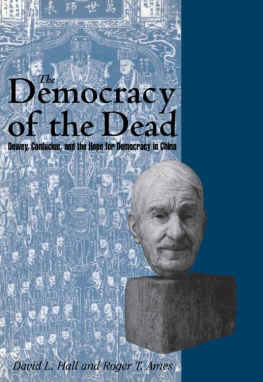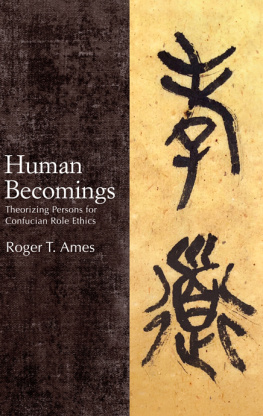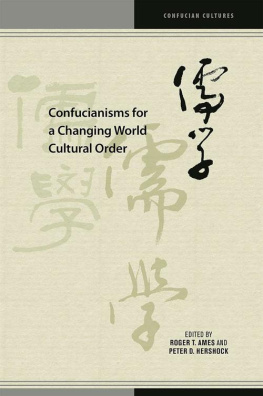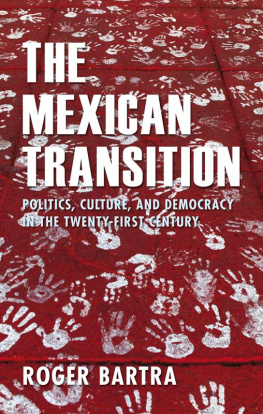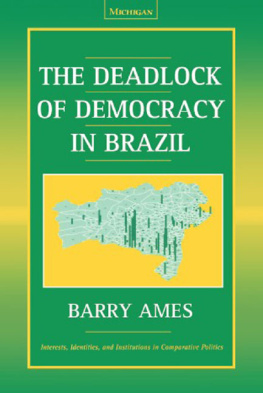Roger T. Ames - The Democracy of the Dead
Here you can read online Roger T. Ames - The Democracy of the Dead full text of the book (entire story) in english for free. Download pdf and epub, get meaning, cover and reviews about this ebook. year: 2015, publisher: Open Court, genre: Science. Description of the work, (preface) as well as reviews are available. Best literature library LitArk.com created for fans of good reading and offers a wide selection of genres:
Romance novel
Science fiction
Adventure
Detective
Science
History
Home and family
Prose
Art
Politics
Computer
Non-fiction
Religion
Business
Children
Humor
Choose a favorite category and find really read worthwhile books. Enjoy immersion in the world of imagination, feel the emotions of the characters or learn something new for yourself, make an fascinating discovery.
- Book:The Democracy of the Dead
- Author:
- Publisher:Open Court
- Genre:
- Year:2015
- Rating:5 / 5
- Favourites:Add to favourites
- Your mark:
- 100
- 1
- 2
- 3
- 4
- 5
The Democracy of the Dead: summary, description and annotation
We offer to read an annotation, description, summary or preface (depends on what the author of the book "The Democracy of the Dead" wrote himself). If you haven't found the necessary information about the book — write in the comments, we will try to find it.
The Democracy of the Dead — read online for free the complete book (whole text) full work
Below is the text of the book, divided by pages. System saving the place of the last page read, allows you to conveniently read the book "The Democracy of the Dead" online for free, without having to search again every time where you left off. Put a bookmark, and you can go to the page where you finished reading at any time.
Font size:
Interval:
Bookmark:
The Democracy of the Dead

ABOUT THE COVER
The terracotta bust of Dewey represented on the cover is a part of the John Dewey Papers, Special Collections/Morris Library, Southern Illinois University in Carbondale, Illinois. The photograph used in the cover design was taken by Robert Joseph ONeil. Though the specific origin of the bust is unknown, it is believed to have been presented to Dewey at some time during his visit to Japan and China in 19191921. The covers background is a portrait of Confucius and his seventy-two disciples carved in wood photographed by the China External Cultural Exchange Association.
To order books from Open Court, call 1-800-815-2280.
Open Court Publishing Company is a division of Carus Publishing Company.
1999 by Carus Publishing Company
First printing 1999
All rights reserved. No part of this publication may be reproduced, stored in a retrieval system, or transmitted, in any form or by any means, electronic, mechanical, photocopying, recording, or otherwise, without the prior written permission of the publisher, Open Court Publishing Company, 315 Fifth Street. P. O. Box 300, Peru, Illinois 61354-0300.
Library of Congress Cataloging-in-Publication Data
Hall, David L.
The democracy of the dead: Dewey, Confucius, and the hope for democracy in China / David L. Hall and Roger T. Ames.
p. cm.
Includes bibliographical references and index.
ISBN 978-0-81269-938-8
1. DemocracyChina. 2. Political cultureChina. 3. ConfucianismChina. 4. Dewey, John, 18591952Contributions in democracy. I. Ames, Roger T., 1947II. Title.
JQ1516.H34 1998
320.951dc21
98-40756
CIP
Tradition means giving votes to the most obscure of all classes, our ancestors. It is the democracy of the dead. Tradition refuses to submit to the small and arrogant oligarchy of those that merely happen to be walking about. All democrats object to men being disqualified by accident of birth; tradition objects to their being disqualified by accident of death.
G. K. Chesterton, The Ethics of Elfland
CONTENTS
For Sondra
On meeting a person of exceptional character, think to stand shoulder to shoulder with her.
Analects 4.17
This book had its origins in an essay written for the 1995 East-West Conference at the University of Hawaii entitled China, Dewey, and the Democracy of the Dead. A number of venues in America, China, Europe, and Koreatoo numerous to cite in detailprovided the authors the opportunity to air many of the ideas found in this book.
A month-long visit to Western China, principally Xinjiang province, sponsored by the Asian Studies Development Committee of the University of Hawaii, and the East-West Center, helped to broaden our sense of the importance of minorities in China.
Participation in the 1996 Bangkok Conference sponsored by the Carnegie Foundation provided an important occasion to reflect upon the issue of human rights in China. Some of the ideas that appeared in the Carnegie journal, Ethics and International Affairs 1997, vol. 11, in Continuing the Conversation on Chinese Human Rights have been reworked here. In addition, the opportunity to give lectures on the topic of Confucianism and Pragmatism in a number of Korean locations further sharpened our understanding of the sense of Asian Democracy. We thank our several hosts at Sogang University, Seoul; Dongeui University and Forum Shinsago, Pusan; Keimyung University and Kyungbuk National University, Taegu and Chonnam National University, Kwangju. We also wish to thank all the USIS (United States Information Service) representatives involved in this project. Special thanks are due to two USIS officers: To John Sullivan, who was always ready at crucial moments with a happy face, and to Hyun-Sun Sohn, whose translations were, by all accounts, a distinct improvement over our original remarks. Thanks, as well, to Chaibong Hahm, of Yonsei University, for soliciting our participation in the ongoing Liberal, Social, and Confucian Democracy initiative in Korea.
We are most grateful to Henry Rosemont, Randy Peerenboom, Dru Gladney, and Jim Buchanan for reading our manuscript in a very rough draft and making suggestions that allowed us to improve the text considerably. And, of course, to Daniel Cole, who sailed us through to final pages.
We happily acknowledge the assistance of Karen Dupell Drickamer, Curator of Manuscripts at the John Dewey Papers, Special Collections/Morris Library, Southern Illinois University for permission to use the representation of the terracotta bust of Dewey appearing on the cover.
Finally, thanks to Sondra Jones who read the penultimate draft of our manuscript with a persistent impatience for convoluted prose. As much as we have benefited from her keen eye, that is the least of the reasons this book has been dedicated to her.
We should, perhaps, apologize for the rather lengthy introduction that follows. Readers opening a book on the topic of democracy in China may reasonably expect a standard political or socioeconomic approach to the subject. But, as those who read on will soon discover, we offer instead a distinctly philosophical discussion which brackets many political and economic issues in favor of a comparison of broad cultural factors and forces relevant to the possible future shape of Confucian democracy. Since, however, the arguments of this work are directed not only to readers of a philosophical turn of mind, but to the more practical political and socioeconomic theorists as well, we hope in the following paragraphs to persuade any such who have happened upon these pages that our book can indeed serve as a stimulus to those working in more specialized areas who are seeking as broad a range of evidence and stimulation as possible.
Alternately comforting and threatening, the realization of Chinas entrance into the modern world increasingly qualifies the sensibilities of Anglo-European Nations. The thought is comforting to those who feel that the engagements made possible by virtue of a common ground are far more productive than the infrequent and one-sided contacts that, until recently perhaps, have done little to help and much to harm the Chinese people. And Chinas entrance into the family of nations is threatening to those who recognize the vast potentialities for economic and military growth possessed by an awakening China, and who, as well, sense that Chinas enlightenment may come at the expense of the West. These contrasting responses, combined in proper proportion, well illustrate the Chinese understanding of crisis (weiji
 ) as expressive of both danger (wei
) as expressive of both danger (wei
 ) and opportunity (ji
) and opportunity (ji
 ). For some years to come, this particular sense of crisis will be the healthiest attitude for both the Chinese and we in the West.
). For some years to come, this particular sense of crisis will be the healthiest attitude for both the Chinese and we in the West.
But maintaining such a balanced perspective is difficult at best. Viewed from the West, China remains pretty much the exotic land it has always been. As is the case with any one or any thing experienced as strangely other, two distinct attitudes shape our best efforts to understand that country. It might seem overdrawn to characterize these attitudes by appeal to the
Next pageFont size:
Interval:
Bookmark:
Similar books «The Democracy of the Dead»
Look at similar books to The Democracy of the Dead. We have selected literature similar in name and meaning in the hope of providing readers with more options to find new, interesting, not yet read works.
Discussion, reviews of the book The Democracy of the Dead and just readers' own opinions. Leave your comments, write what you think about the work, its meaning or the main characters. Specify what exactly you liked and what you didn't like, and why you think so.

